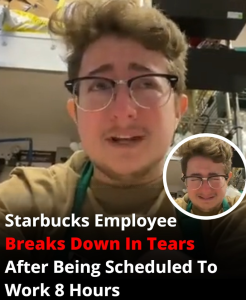Starbucks Employee Breaks Down in Tears After Being Scheduled to Work 8 Hours — A Viral Moment That Sparked a Bigger Conversation
It began with a shaky phone video, just under two minutes long, posted on TikTok by a young Starbucks barista. In the clip, the employee—visibly emotional, tears streaming down their face—vented about being scheduled for an eight-hour shift and the stress of dealing with customer demands, lack of breaks, and the overwhelming pressures of life. Within hours, the video exploded online, garnering millions of views, thousands of comments, and sparking a full-blown debate that went far beyond one person’s tough day at work.
What happened here wasn’t just a breakdown—it was a breakthrough moment in the ongoing discussion about mental health, burnout, and the expectations placed on workers, particularly those in the service industry.
The Video That Sparked It All
The barista, whose name was later revealed to be Jordan, appeared distraught. Their voice cracked as they described being scheduled for a full eight-hour shift on short notice, which clashed with their school commitments and personal obligations. The store was short-staffed, and they’d been expected to cover multiple roles during the day.
“I’m literally shaking,” Jordan said through tears. “I asked for fewer hours this week because of my exams. Now they’ve scheduled me for a full shift, and customers are yelling, the drive-thru is backed up, and I haven’t had a break in four hours.”
That raw honesty—pain, frustration, and exhaustion—struck a nerve with viewers. For some, it was an overreaction. But for many, it was a powerful reminder of the real human toll behind the counters of coffee shops, fast food joints, and big-box stores.
Internet Reactions: Divided and Loud
As expected with viral content, the reactions were intense—and divided. Some mocked Jordan, calling the breakdown “soft” or “dramatic.” Comments like “It’s just coffee, calm down,” and “This generation can’t handle real work,” flooded in from critics.
But others saw something more serious—a symptom of deeper problems. Mental health advocates, service workers, and even some former Starbucks employees rallied in support. “You’re not weak,” one popular comment read. “You’re human in a system that expects you to be a robot.”
Thousands shared their own experiences—nurses who worked 12-hour shifts without breaks, warehouse workers penalized for bathroom trips, students juggling multiple jobs just to stay afloat. The overwhelming theme: people are stretched too thin, and emotional breakdowns are no longer rare—they’re routine.
The Modern Workplace Pressure Cooker
What Jordan’s breakdown exposed wasn’t just about Starbucks or coffee—it was about a growing pressure on workers, especially in minimum-wage or entry-level jobs, to push themselves to the brink.
Gone are the days when “just doing your job” meant clocking in and out. Today’s workers are expected to:
-
Manage stressful customer interactions
-
Maintain perfect productivity metrics
-
Adapt to sudden shift changes or understaffing
-
Balance school, family, or second jobs
-
Smile through it all
Add to this the financial stress many young workers face—rising rent, student loans, groceries—and an eight-hour shift isn’t just work. It’s a trigger for exhaustion, anxiety, and in some cases, collapse.
Starbucks Responds
The company didn’t release an official statement about Jordan’s video, but a spokesperson emphasized Starbucks’ commitment to employee wellness and flexibility.
However, internal sources revealed that this wasn’t an isolated case. Several baristas across the country had been raising concerns about understaffing, unpredictable scheduling, and the challenges of balancing part-time work with life.
Starbucks has long marketed itself as a progressive employer, offering benefits even to part-time workers. But critics say the reality doesn’t always match the branding—especially in high-traffic locations or during seasonal rushes.
Gen Z: Lazy or Overwhelmed?
One major theme the video touched off was the broader generational conversation. Some saw Jordan’s video as a reflection of a “weaker” generation. Memes emerged comparing older workers doing double shifts without complaint to younger ones “crying over cappuccinos.”
But psychologists and sociologists offer a different view. Gen Z is the most anxious generation on record, with soaring rates of depression, burnout, and workplace dissatisfaction. It’s not about fragility—it’s about reality.
They’ve grown up in a world of economic uncertainty, global crises, and constant connectivity. They’re more likely to speak out about mental health, question toxic work cultures, and demand more than just a paycheck—they want respect, balance, and empathy.
When Crying at Work Becomes the Norm
Jordan’s video opened the floodgates. Hashtags like #CryingInTheBackroom and #BaristaBreakdown started trending, with employees from all industries—retail, hospitality, healthcare—sharing their own stories.
One retail worker wrote:
“I once sobbed while stocking shelves because I had three hours of sleep and my manager yelled at me for going too slow. I thought I was just weak. Now I realize I was burned out.”
Another said:
“This Starbucks video made me feel less alone. It’s not just me. We’re all carrying too much.”
It became clear: emotional breakdowns at work aren’t rare—they’re widespread and quietly normalized.
A Wake-Up Call
The viral breakdown wasn’t just a sad moment; it was a mirror. It showed the world how normalized overwork and emotional suppression have become. When someone can’t express distress without being ridiculed, it begs the question—what are we teaching our workers about strength? That pushing through pain is honorable? That crying is weakness?
Instead, what if we looked at that video and said:
“This is a human being asking for help. How can we change the system so they don’t have to break down in a bathroom to be heard?”
Conclusion: More Than Just a Coffee Shop
Jordan may have been just one Starbucks employee on one bad day, but their video stirred something far bigger. It reminded us that behind every smiling barista, retail clerk, or fast food cashier is a person. A person with limits. A person with stress. A person who, sometimes, just needs to cry.
And maybe the next time we walk into a store and see someone behind the counter, we’ll remember that their eight-hour shift might be the tip of a much bigger struggle.


